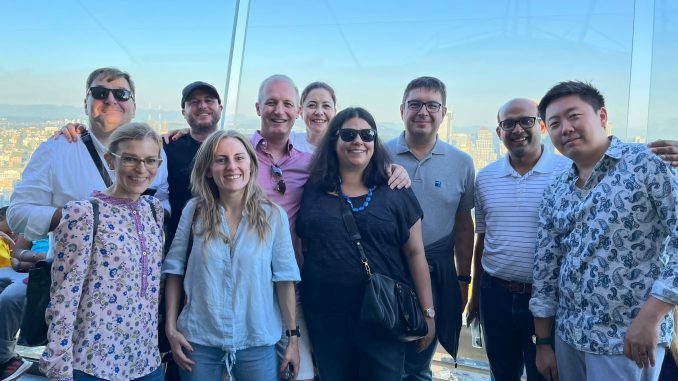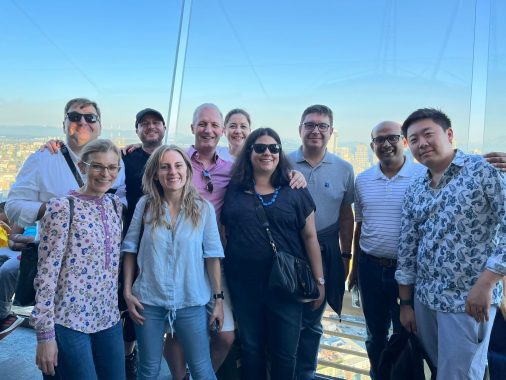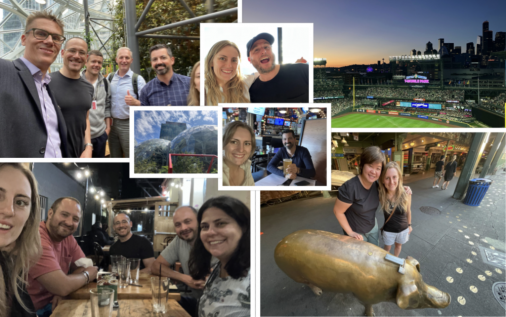

Our sixth residency is now over. It was a different kind of residency because it was not a normal class, but instead, the participation in the Annual Meeting of the Academy of Management (AOM). The AOM is a professional association for management scholars and organizations founded in 1936. It publishes several academic journals, organizes conferences, and provides managers with forums for communicating research and ideas.
How it is structured
You can think of it like any other big conference but held in different venues where new findings are presented. Usually, a lecture consisted of about three to five speakers who presented their papers, and sometimes there were other experts who joined the discussion panels. There were lectures with presentations and sometimes the speakers gave impromptu speeches.
Preliminary work
Before we start the journey, we should deal with the program itself. I was quite surprised when I found out how extensive the program is. It went from Thursday to Wednesday, and you could be in sessions from about 5 a.m. until 10 p.m. But it was not only papers that were presented. For example, there was also a course that offered a walk in the park or meditation.
We were given a minimum number of lessons by ESMT. We had to select these in advance and upload them to a calendar. Beforehand, we were provided with a pre-recommendation. However, we still had the possibility to choose outside the recommendations.
When making my selection, I thoroughly went over the program list and read more if the title appealed to me. That took half an eternity because as mentioned, there was a lot to choose from. But that was not the only reason. Unfortunately, the AOM app is not particularly well-built, so it was difficult to orientate the app.
Also, at this point, I decided to do my master’s thesis and not a project thesis as my final work. This meant that I didn’t know exactly which area I should focus on as I have not explored the master’s thesis in-depth yet. That made the choice a bit trickier as it is best to choose lectures according to the topic of the project work. If it is possible for you, make it clear beforehand what your topic will be, so you can filter it more easily in the app and don’t have to go through everything.
The location
The conference is held in a different location each year and this year’s conference took place in Seattle in the USA. I was not familiar with the city and have since learned quite a bit about it. For example, that’s where the first Starbucks was founded, and the queue is accordingly long there. I found this out regretfully when I wanted to meet up with classmates in the evening and needed something to eat quickly.
I visited the Pike Place Market where you can buy many things from food to souvenirs and I took two extensive walks along the river, which was very enjoyable. It was a pleasure to experience the peace and quiet in comparison to my noisy place of residence, Berlin.
Social events

If you remember my previous articles, there has been a social event every time so far. This time we had an evening dinner as a class in a very nice hotel right by the water.
We also had the opportunity to visit the Amazon Spheres. An EMBA alum arranged a small tour of a part of Amazon’s headquarters for us. Of course, we also had free time to do some sightseeing by ourselves.
I visited Rachel the Piggy Bank and the Space Needle. Both are very recommendable sights. Most of the class went to a baseball game which I found entertaining and was surprised to learn that baseball games last around 3 hours.
Lessons learned
The AOM is an academic event so in part, it was very theoretical and I’m not sure if you can implement everything that way. An example of this would be hypothesis testing at a start-up. Here, testing should be done until it results in a fully functional business model. But sometimes hypothesis testing is just too expensive and can take too long. For this reason, one would start earlier with the MVP (minimum viable product) in the start-up life.
Nevertheless, I find it good to create links between theory and practice. In my opinion, there should be more events that link the two and encourage discussion. Or dialogues, as I have learned. The goal of a dialogue is to learn from each other, whereas a discussion was introduced to us as the negative counterpart of dialogue. So, a discussion is more about expressing your own opinion.
However, if you are an expert, you can create your own links and use the AOM as a tool for that. During my time in Seattle, I spoke with some of my classmates about how nice it would be to have a class reunion every couple of years and meet at the AOM. Let’s see, maybe we will see each other there. In any case, it left me wanting more and was an inspiring event.
This article was originally published on my blog.
